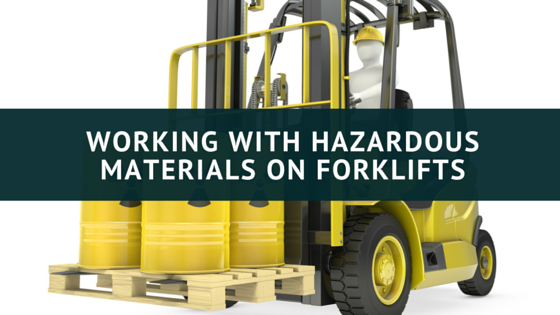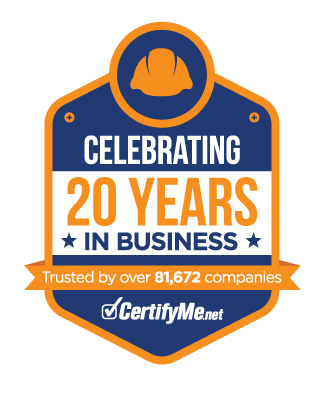Forklift Hazardous Materials Handling: OSHA Safety Tips for 2025
Posted by: admin on April 10, 2025
 Operating a forklift around hazardous materials demands more than basic driving skills. Mishandling dangerous substances can lead to workplace injuries, costly spills, and OSHA violations. For this reason, proper forklift hazmat handling training is essential to keeping workers safe and businesses compliant.
Operating a forklift around hazardous materials demands more than basic driving skills. Mishandling dangerous substances can lead to workplace injuries, costly spills, and OSHA violations. For this reason, proper forklift hazmat handling training is essential to keeping workers safe and businesses compliant.
What Are Forklift Hazardous Materials?
Hazardous materials transported by forklifts include substances classified as carcinogenic, flammable, toxic, or reactive. Forklift operators might encounter industrial solvents, flammable liquids, compressed gas cylinders, or corrosive battery acids during a typical workday. Recognizing these materials quickly ensures correct handling and minimizes accidents.
How OSHA Regulates Forklift Hazardous Materials
OSHA Hazmat Standards for Forklift Operators
Federal OSHA regulations require written programs detailing how hazardous materials are stored, transported, and handled by forklift drivers. Proper labeling, up-to-date worker training, and routine inspections are mandatory components of a compliant hazmat program.
Spill Prevention and Response Plans
Every employer must maintain a written emergency plan addressing hazardous material spills. This plan must include employee evacuation procedures, spill containment methods, and required use of PPE like gloves, goggles, and chemical-resistant clothing.
Forklift Hazmat Handling Safety Procedures
Pre-Inspection Protocol
Before each shift, operators must check that hazardous material containers are secure, clearly labeled, and leak-free. Loose loads, missing hazard symbols, or damaged containers require immediate attention.
Safe Driving Techniques
Maintaining slow speeds, avoiding sudden movements, and steering carefully around turns becomes even more critical when transporting dangerous materials. Even minor jolts can dislodge unstable loads, leading to serious consequences.
Emergency Response Basics
Forklift operators must act quickly and methodically in the event of a spill. First, assess the situation from a safe distance. Then, initiate containment measures and notify emergency personnel according to OSHA and site-specific plans.
Common Forklift Hazardous Materials You Might Handle
- Industrial solvents used in manufacturing and cleaning
- Gas cylinders storing compressed gases
- Flammable liquids like gasoline or diesel
- Battery acid from electric-powered forklift batteries
How to Identify Hazardous Loads Quickly
Hazardous materials are often labeled with diamond-shaped placards indicating their danger level. Leaks, unusual odors, or damaged containers are additional signs that extra caution is needed. Operators must review Safety Data Sheets (SDS) for unfamiliar substances.
Forklift Hazardous Material Spill Cleanup Steps
Step 1: Assess from a Safe Distance
Operators should never rush into a hazmat spill unprotected. First, identify the material involved by checking placards, labels, or SDS resources.
Step 2: Contain and Control
Using absorbent barriers, sand, or booms prevents the spill from spreading to drains or ignition sources. Quick containment limits environmental and health impacts.
Step 3: Decontaminate and Document
Once the material is contained, crews must clean the area with approved methods and log the spill in the company’s incident records. Some spills may require reporting to OSHA depending on quantity and severity.
FAQs About Forklift Hazmat Handling
What materials require forklift hazmat handling certifications?
Any material classified as toxic, flammable, corrosive, or reactive typically requires specialized hazmat certification for forklift operators.
Can forklifts legally transport hazardous waste?
Yes, but only under strict federal and state regulations governing labeling, containment, and training.
Are forklift spills always reportable?
Spills involving dangerous quantities, injury, or environmental damage must be reported according to OSHA and EPA rules.
How often should workers be trained in forklift hazardous material handling?
Annual refresher training is recommended, while OSHA mandates re-training after accidents, near-misses, or significant procedural changes.
Stay OSHA Compliant with CertifyMe Forklift Hazmat Training
Keeping your warehouse safe starts with comprehensive forklift hazardous material training. CertifyMe offers fast, affordable, OSHA-compliant forklift hazmat certification available entirely online. Our programs feature free three-year renewals and 24/7 access to make compliance simple and cost-effective. Prepare your workforce for any hazardous load today with CertifyMe!
Welcome to CertifyMe.net
CertifyMe.net has offered online forklift certification since 1999. With Our Convenient online program. your employess can earn their certification in an hour or less.
Browse Online Certifications:
This low-cost program can be compeleted anytime, anywhere!






